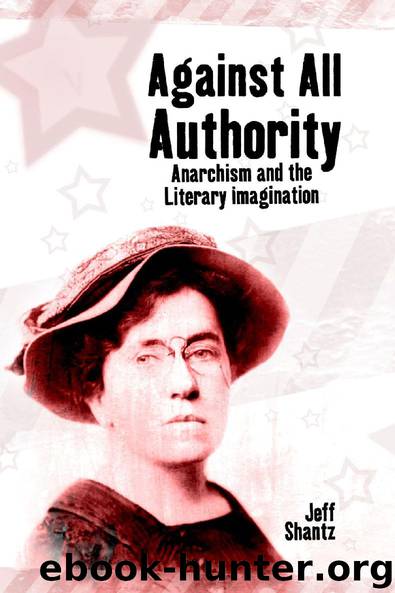Against All Authority by Jeff Shantz

Author:Jeff Shantz
Language: eng
Format: epub
Tags: anarchism, anarchy, literature, Ursula LeGuin, Emma Goldman, Marxism, feminism, realism, socialism, sociology
ISBN: 9781845403249
Publisher: Andrews UK Limited 2012
Published: 2012-08-08T00:00:00+00:00
2 One might also make note of the importance of ideas Joyce borrowed from Vico whose emphasis on corsi and ricorsi in the writing of history greatly influenced Sorel.
6 - Beyond socialist realism: Anarchism and glocal concerns in the writings of Wole Soyinka
The poetry of African poets over the last several decades asserts a fierceness, passion, originality and vitality that is lacking from much of recent western poetry (Moore, 1998). Indeed, African poets are presenting some of the most compelling and exciting poetry in the world. The lack of broad discussion of and attention to African poetry is surprising given both the traditional significance of poetry in many African cultures and the creative power of recent African poets. The poems (of struggle) affirm another Africa, beyond the gloom and sorrow presented as the only face of Africa in the western press. An appreciation and understanding of African poetry is essential in the current context where many are turning to cultural expressions opposed to the processes and effects of capitalist globalization.
Not only the familiar ones of poverty and oppression, but those newly imposed by the IMF, with its insistence on cuts in health and education services, which mortgage the future as well as the present. And all this to the background of an international community that veers between blundering interference and cynical indifference; between using helicopter gunships to hunt down a single man and turning its back on genocide. (ibid., xxiv)
In this poetry is a refusal to succumb, to let go of fundamental values. In the works of certain contemporary African poets one finds challenging perspectives within revolutionary thought that go beyond the categories and visions of much art or revolutionary theory. These poets raise alternatives based on the practices, values and ideas of indigenous forms of social organization which have been de-valued by some variants of socialism.
Listening to voices that express viable African alternatives offers various benefits, “not the least of which is the opportunity it offers black Africa to become a source of usable ideas, rather than merely a consumer of them” (Owomoyela 1991, 36). This is as important as ever in the age of globalization as the circulation of social struggles and social visions is vibrantly and vitally expressed in processes of engagement that will shape the future of life on the planet. In these poems one can catch glimpses of organizing for self-determination and the undermining of oppressive systems. These glimpses offer responses to the pressing problems and challenges facing people around the globe. African poets like Wole Soyinka strive to see and understand their postcolonial (or neocolonial) worlds differently in order to resist, to fight back. Their works also offer new insights for others trying to fight back. At the same time these poets manage to avoid the risks some poets face of succumbing to rhetorical commonplaces as they struggle to put forward a political vision. There is no confusion of propaganda with art or substitution of propaganda for art. These poets do not compromise or sacrifice their artistry to make a political point.
Download
This site does not store any files on its server. We only index and link to content provided by other sites. Please contact the content providers to delete copyright contents if any and email us, we'll remove relevant links or contents immediately.
| Anthropology | Archaeology |
| Philosophy | Politics & Government |
| Social Sciences | Sociology |
| Women's Studies |
The Secret History by Donna Tartt(17527)
The Social Justice Warrior Handbook by Lisa De Pasquale(11721)
Thirteen Reasons Why by Jay Asher(8145)
This Is How You Lose Her by Junot Diaz(6148)
Weapons of Math Destruction by Cathy O'Neil(5467)
Zero to One by Peter Thiel(5176)
The Myth of the Strong Leader by Archie Brown(4985)
Beartown by Fredrik Backman(4906)
How Democracies Die by Steven Levitsky & Daniel Ziblatt(4703)
The Fire Next Time by James Baldwin(4684)
Promise Me, Dad by Joe Biden(4676)
Stone's Rules by Roger Stone(4627)
100 Deadly Skills by Clint Emerson(4402)
Rise and Kill First by Ronen Bergman(4296)
A Higher Loyalty: Truth, Lies, and Leadership by James Comey(4274)
The David Icke Guide to the Global Conspiracy (and how to end it) by David Icke(4151)
The Farm by Tom Rob Smith(4118)
Secrecy World by Jake Bernstein(4070)
The Doomsday Machine by Daniel Ellsberg(3993)
